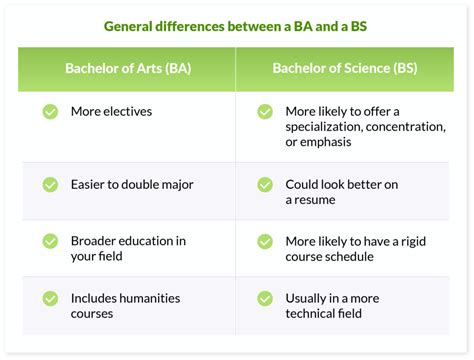When you’re choosing a college major, you’ll likely come across two different types of degrees: a Bachelor of Arts (B.A.) and a Bachelor of Science (B.S.). While both degrees are four-year undergraduate degrees, there are some key differences between them.

Core Curriculum
The core curriculum for a B.A. degree typically includes a strong foundation in the liberal arts, such as English, history, philosophy, and foreign languages. B.S. degrees, on the other hand, focus more on science, mathematics, and technology.
Major Requirements
The major requirements for a B.A. degree are typically more flexible than those for a B.S. degree. B.A. students have more freedom to choose courses that interest them, while B.S. students must complete a set of core courses in their major field of study.
Career Paths
B.A. degrees are often seen as more well-rounded and suitable for careers in fields such as writing, editing, teaching, and law. B.S. degrees are typically more specialized and can lead to careers in fields such as engineering, computer science, and healthcare.
Which Degree Is Right for You?
The best way to decide which degree is right for you is to consider your career goals. If you’re interested in a career in the liberal arts, a B.A. degree may be a good choice. If you’re interested in a career in science, technology, engineering, or mathematics, a B.S. degree may be a better option.
Table: B.A. vs. B.S. Degree Comparison
| Feature | B.A. Degree | B.S. Degree |
|---|---|---|
| Core Curriculum | Liberal arts | Science, mathematics, and technology |
| Major Requirements | More flexible | More structured |
| Career Paths | Writing, editing, teaching, law | Engineering, computer science, healthcare |
| Best for Students Interested in | Liberal arts | Science, technology, engineering, mathematics |
Table: Popular B.A. and B.S. Degree Programs
| Degree Type | Popular B.A. Programs | Popular B.S. Programs |
|---|---|---|
| B.A. | English, history, philosophy, political science, psychology | |
| B.S. | Biology, chemistry, computer science, engineering, mathematics |
Table: Pros and Cons of B.A. and B.S. Degrees
| Degree Type | Pros | Cons |
|---|---|---|
| B.A. | More flexible | Less specialized |
| B.S. | More specialized | Less flexible |
Table: Strategies for Choosing the Right Degree
| Step | Description |
|---|---|
| 1 | Consider your career goals. |
| 2 | Research different degree programs. |
| 3 | Talk to your academic advisor. |
| 4 | Visit the career center. |
| 5 | Make a decision and stick to it. |
Why It Matters
Choosing the right degree can have a significant impact on your career. A B.A. degree can provide you with a broad foundation in the liberal arts, while a B.S. degree can give you the specialized knowledge and skills you need for a career in science, technology, engineering, or mathematics.
Benefits of Choosing the Right Degree
- Increased career opportunities
- Higher earning potential
- More job satisfaction
- Greater sense of purpose
Conclusion
Choosing the right degree is an important decision. By understanding the differences between a B.A. and a B.S. degree, you can make an informed decision that will help you reach your career goals.
